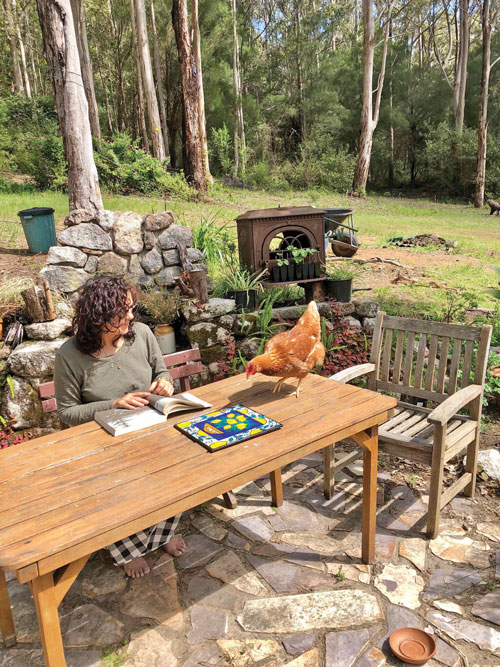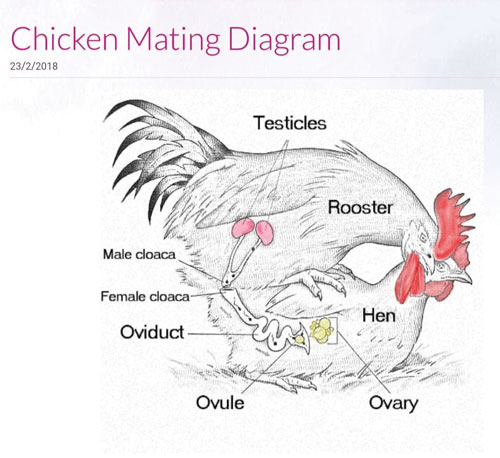ABOVE: Happy hens. Hatched as hens, these Hyline Brown free range hens at Fremantle Egg Company enjoy the good life, laying for about 70 weeks before being turned over. Males hatched at the same time would have been killed.
Having advocated in my past two columns for the lives of roosters and cockerels, this month I’m excited to highlight a story by BBC science correspondent Pallab Ghosh, who recently reported on the development by Israeli researchers of gene-edited hens that lay eggs from which only female chicks hatch.
Such a breakthrough could prevent the slaughter of billions of male chickens each year, culled simply because they’re the wrong sex and can’t lay eggs.
According to the researchers, the female chicks – and the eggs they lay when they mature – have no trace of the original genetic alteration.
Significantly, animal welfare group Compassion in World Farming has backed the research.
The project’s chief scientist Yuval Cinnamon, from the Volcani Institute near Tel Aviv told BBC News that the development of what he called the ‘Golda hen’ would have a huge impact on animal welfare in the poultry industry.
The scientists have gene-edited DNA into the Golda hen that can stop development of male embryos in eggs they lay.
The DNA is activated when the eggs are exposed to blue light for several hours.
Female chick embryos are unaffected by the blue light and develop normally.
The chicks have no additional genetic material inside them nor do the eggs they lay, according to Dr Cinnamon.
“Farmers will get the same chicks they get today, and consumers will get exactly the same eggs they get today,” Dr Cinnamon said.
“The only minor difference in the production process is that the eggs will be exposed to blue light.”
Dr Cinnamon’s team has not published its research because they plan to license the technology through spin-out company Poultry by Huminn, so scientists independent of the research group have not been able to assess the claims.

While hens typically lead a charmed life, most male chicks don’t survive beyond hatching.
Interestingly, the Israeli team has worked in conjunction with the UK-based animal welfare organisation Compassion in World Farming, whose staff have followed the research for three years.
CIWF chief policy advisor Peter Stevenson believed the breakthrough could be a very important development for animal welfare, despite admitting he was usually quite wary of gene-editing farm animals.
But he described this as an exceptional case, hence why he and his CIWF colleagues supported it.
“The next important step is to see whether the hen and the female chicks she produces, which will lay eggs for human consumption, can go through a commercial lifespan without any unexpected welfare issues arising,” Mr Stevenson said.
Legislation that would allow limited gene-editing for commercial farming in England is currently passing through the UK Parliament.
The BBC reported that once the bill was passed early next year, regulations would be eased gradually, allowing the technology to be used only for plants to begin with.
Gene editing is perceived by the government as more publicly acceptable than the older technique of genetic modification
GE usually involves controlling genes by removing DNA, whereas GM usually adds DNA, sometimes from another species.
CIWF estimates around seven billion male chicks are slaughtered by the egg-producing industry each year shortly after they are born because they are of no commercial value.
The process is also time consuming, with males sorted by hand shortly after hatching.
The German Government banned mass killing of male chicks at the start of 2022, while the French have similar proposals to start this year.
Most other European Union nations are concerned about the practice, with many calling for EU-wide legislation.
The UK Government has yet to comment on the practice.

It’s a rare male chick that comes out on top.
Enbal Ben-Tal Cohen, who led the research, told BBC News that the system was at an advanced stage of development and the team was working with breeders to refine the process.
“Through many years of research there were numerous difficult challenges we overcame and now we have a viable solution, I hope industry will adopt it very soon,” Dr Cohen said.
While it remains an inconvenient truth that 50 percent of all newborn chicks are killed as part of egg production, including here Down Under, I believe it’s incumbent on industry to do all in its power to seek viable non-sexist solutions.
The more the public is aware of the culling of male chicks, the more they’ll demand change.
As an ‘old rooster’ myself, I say bring it on.
Meanwhile, I’m happy to be ‘hen pecked’ by readers who have a different view.
Share your thoughts in this publication.
It’s a free-for-all forum and an ideas incubator.

